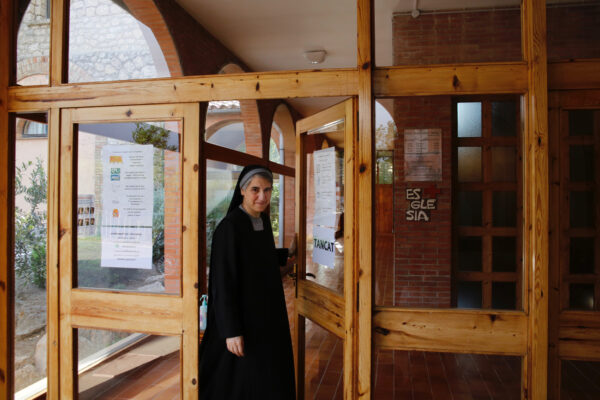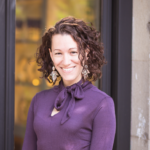This article was originally published by The Independent, with the support of CRCC’s global project on engaged spirituality.
It’s time to reimagine the debate around abortion. We are trapped in the tyranny of a binary choice: one side sees baby murderers; the other, patriarchal dictators who want to control women’s bodies. This diametrically opposed pro-life/pro-choice discourse is a closed-loop. The result: a country that is dumbed down by polarisation.
I’m a millennial raised in San Francisco, “pro-choice” and “reproductive rights” might as well have been my lullabies. At 15, I darted over to my nearest Planned Parenthood health center to get birth control pills. I wasn’t sexually active and I hadn’t even had my first period, but I pocketed them with pride – a souvenir of personal choice.
Throughout adulthood, the pro-choice/pro-life binary gave me a comfortable foothold in the abortion debate and a prefabricated enemy to address. That changed when I met Sister Teresa Forcades, a former medical doctor, theologian and Catholic nun who supports abortion rights.
In our catchphrase country, complexity is like dirty dishwater – opaque and best avoided. But after the Supreme Court decision to strike down Roe v Wade, it is precisely what we need. The majority of Americans refuse to think in such absolutes when it comes to abortion. Most of us are more inclined to say “it depends”.
We need a common framework broad enough for the heart of the abortion debate: what does it mean to be a human with dignity?
Based in Barcelona, Spain, Sister Forcades’s vocal opposition to the church’s stance on abortion has earned her the moniker Europe’s most radical nun. Christian fundamentalist news sites have dubbed her “The Abortion Nun” and “The Nun of the Devil”. In 2009, the Vatican sent a letter demanding she withdraw her abortion views and be disciplined (yes, even nuns risk getting cancelled!). Instead, Forcades replied with a theological argument for reproductive rights so rigorously articulated that it silenced her Catholic cohort. Thirteen years later, the Vatican is yet to respond.
But she won’t be called pro-choice. She says this binary limits the possibility that she can simultaneously believe in the sanctity of life and abortion rights.
Her argument is also deceptively simple. The essence of the classic pro-life argument is that the mother who aborts a pregnancy is choosing to kill her child, and must be forced not to. But take another example: a father whose child needs a kidney transplant to survive.
Hear Sister Forcades’ Case for Reproductive Rights
She asked: “Is the church ready to force the father under punishment of imprisonment, or ex-communication, to give the kidney to the child? The answer: The church is not.”
“It will not make the father feel that the whole rage of God is going to fall upon him if he does not offer a little bit of his body to save the life of his child. No, it’s not doing it.” Such a practice could ideologically justify all kinds of abuses like “sacrificing one person for the sake of saving a few others by distributing that person’s organs”, she adds.
Her argument is sound, but it’s the simplest detail that struck me most: the man’s body. According to the Catholic church, a man doesn’t have to give a kidney to his child, yet a woman (in the grip of a life-threatening pregnancy) must surrender her body to the foetus.
This role reversal and subtle push against double standards add a refreshing jolt of feminism to the abortion debate – one that the original Roe v Wade decision never quite delivered. The 1973 Supreme Court ruling hinged on a pregnant person’s constitutional “right to privacy”, which protects this individual’s right to choose.
The philosopher Immanuel Kant said a human being should never be an instrument for somebody else, as that runs against our dignity. Turning a man into a machine for organ-making, for example. Likewise, Forcades says, banning abortion turns a pregnant woman into an instrument of human reproduction, violating the very thing that makes us human.
When I met her, Forcades told me: “The dignity of the person is something the church has been defending for centuries; sometimes alone in very difficult contexts.”
What happens when a pregnant woman’s dignity, or very survival, is in direct conflict with the dignity of the life she carries? Is a mother’s life more or less valuable than the child who relies on her for survival? And just as importantly, is the church or state ethically equipped to make this decision?
Clearly, entering such a conversation, free of guardrails, isn’t about finding answers. It’s about provoking more questions. We mustn’t dupe ourselves into thinking that dialogue will lead to larger shared truths or even common ground. Nor should we feel compelled to just brush things to their neat corners with the liberal catchphrase: “Everyone has a right to their own opinion.”
A break from the binary should, instead, be seen as an invitation to be uncomfortable – the permission to say: “it’s complicated.”
Click here to read the story on The Independent
Linda Freund is a journalist fellow with the Spiritual Exemplars Project.







